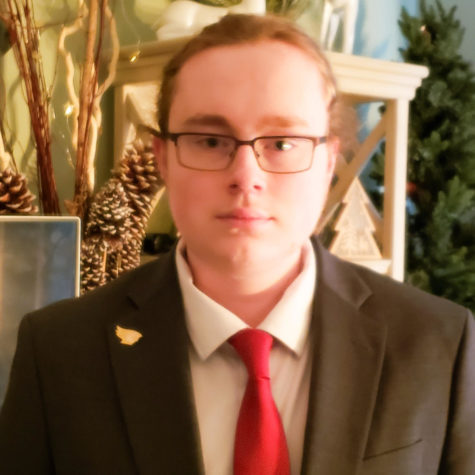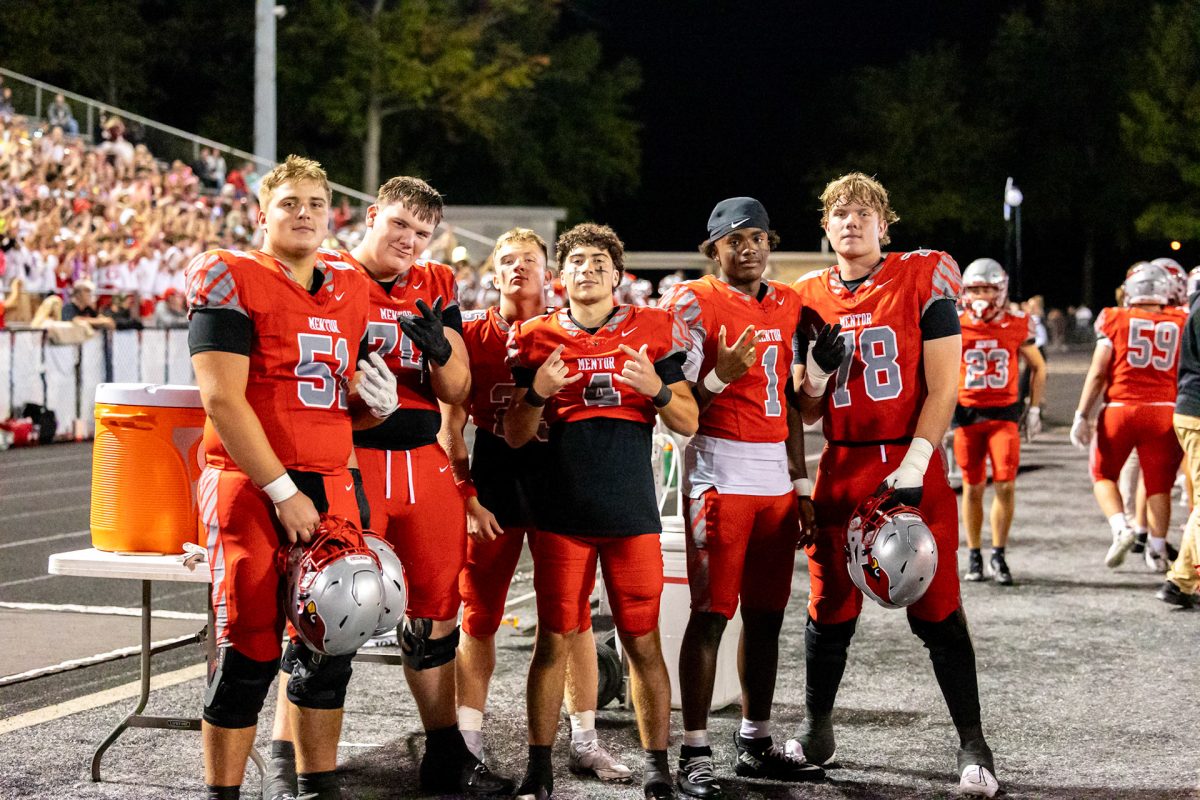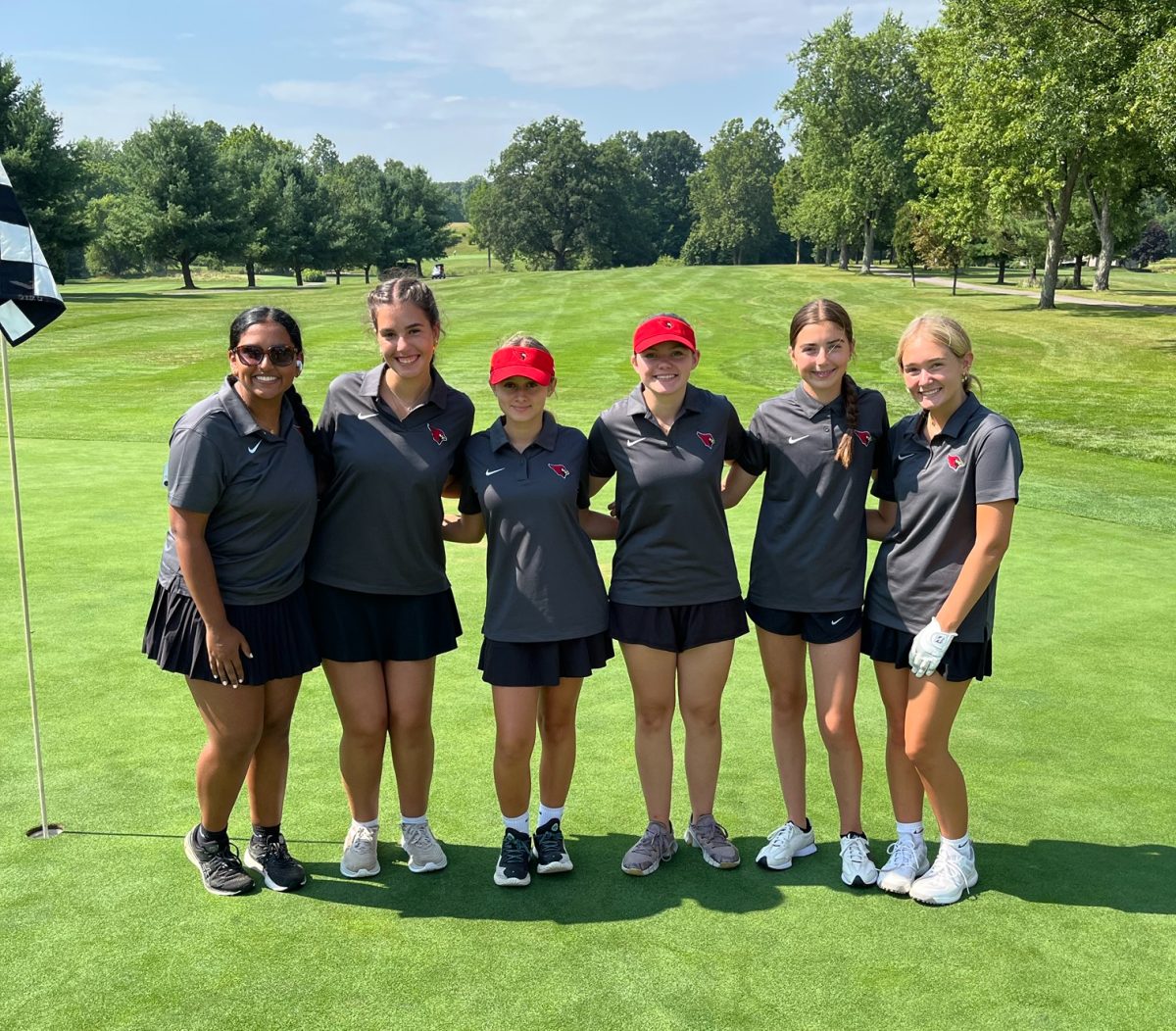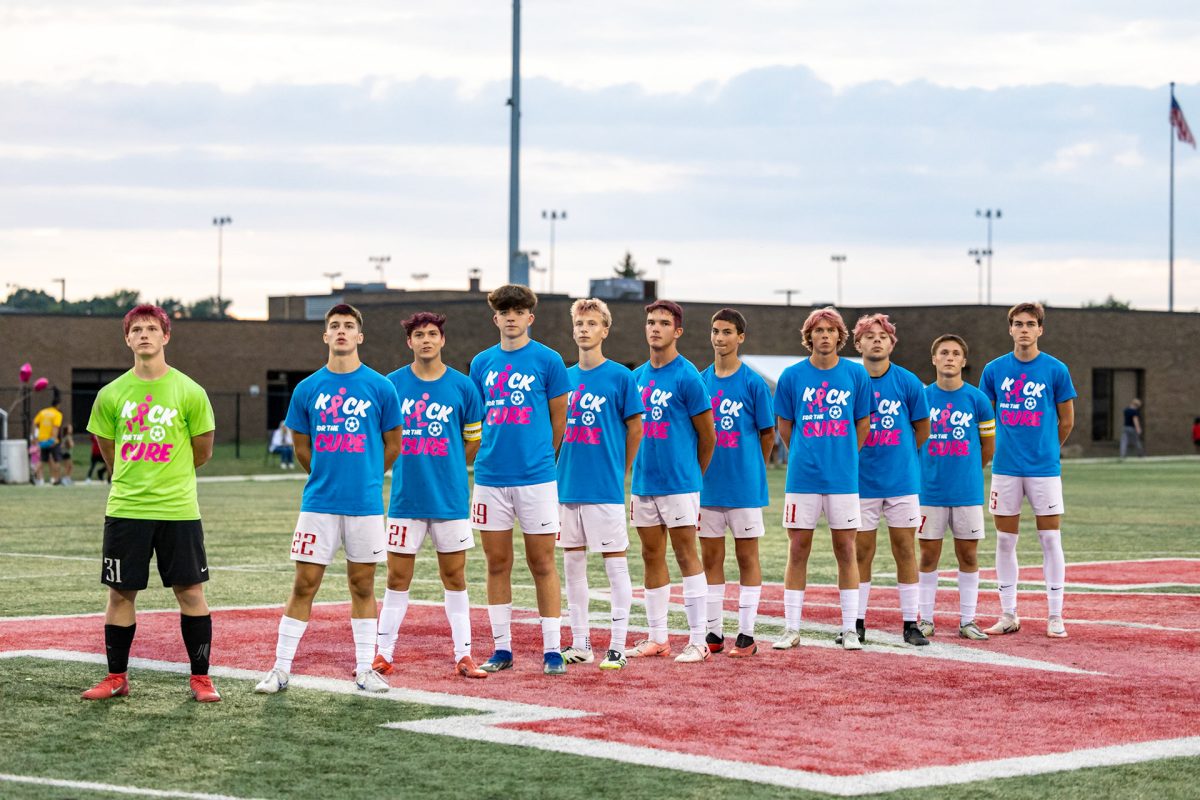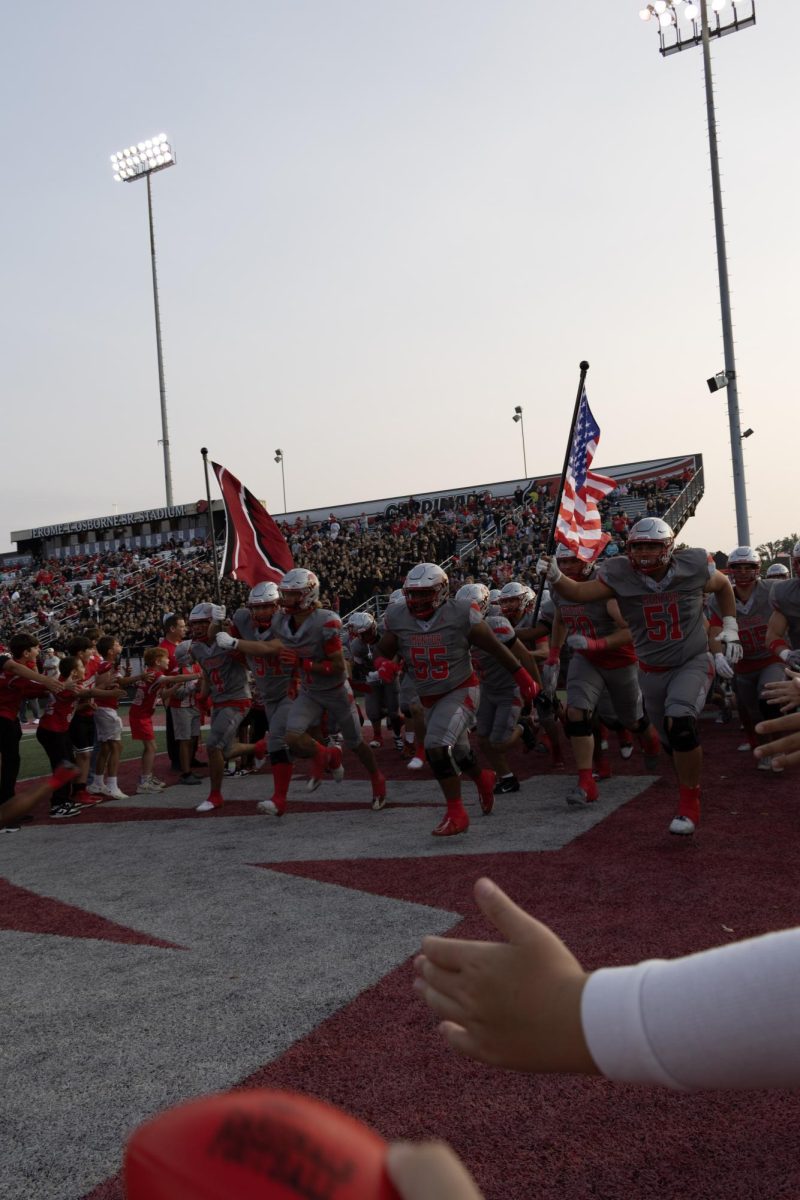Mentor Speech and Debate co-captains head to national competition
Hear from the team captains of the Mentor Speech and Debate team about their experiences and preparing for a national competition in Kentucky in June
This image was taken before our team went to states. The people who made the state team were Caitlin Wong, Ishani Zimmerman, Caden Coleman, and Doug Slovenkay. Doug Slovenkay is also an alternate for the national team.
May 6, 2022
On June 12, our Mentor Speech and Debate team is going to the National Tournament in Louisville, Kentucky where they will be competing with people from all over the country. Team captains, Ishani Zimmerman and Caden Coleman, are both in 11th grade and both qualified to participate at the National Tournament.
Speech and Debate is an academic extra curricular activity in which there a wide variety of events within three categories – Interpretation, Public Address, and Debate. Interpretation events require the student to use an already published piece of work and perform it. Public Address events have the student create a piece and deliver it. Debate events are where the student debates about moral questions and tries to persuade a judge towards their point. While competing, you can earn points towards your NSDA account that help you earn NSDA degrees. Rules might vary depending on the event, but no matter if you win or lose you would still earn points. You can also earn medals for your placement.
Cardinal Nation talked to these co-captains about the upcoming National Tournament.
Cardinal Nation: What is Speech and Debate like?
Ishani Zimmerman: Speech and Debate is a lot of fun! It’s basically a tournament where a bunch of people get together on Saturdays across schools to either argue or talk, though there is a bit more structure involved in it. There are many different events that cover a bunch of different topics to debate or give a speech about, so there’s something for everyone!
Caden Coleman: I think, in my nearly five years on the team, I have gained a lot from my experience. In terms of developing my speaking and arguing skills, I have also been able to learn to work effectively with a team towards a goal. Both of these learning experiences have been important throughout not only my speech and debate experience as I become more skilled, but are skills I use in school and outside school in developing relationships.
Cardinal Nation: Why do you participate in Speech and Debate?
Ishani Zimmerman: It’s probably not the best thing (for me) at times as I’m (already) a pretty argumentative and competitive person! I really enjoy having fun, intellectual conversations with people, and an excuse to research and ponder the ethics of many different topics, and Speech and Debate provides that for me! It’s also a good way to keep up to date on political topics and learn more about the intricacies of different issues and world events.
Caden Coleman: I enjoy all of my time on Speech and Debate experiences and the skills I have learned have been and will continue to be beneficial to me in many ways.
Cardinal Nation: What event(s) have you done in Speech and Debate and what are those event(s) like?
Ishani Zimmerman: I’ve done a couple of different events in Speech and Debate! From eighth grade to the first semester of tenth grade, I did “Big Questions,” which is a philosophically based even that asks competitors to debate questions like “Do humans have free will?” and “Are humans primarily motivated by self interest?” I really loved the event, but unfortunately, not a lot of people compete in it, so halfway through sophomore year I switched to Lincoln Douglas, which asks philosophical questions in the context of political or world events, like “Is it ethical for private companies to appropriate outer space?” or “Should workers have an unconditional right to strike?” While eventually I grew to enjoy it more, LD has one of the toughest learning curves for getting into the event, and is also the most competitive, so while it was a little discouraging at times in the beginning, it really helped me learn to appreciate debate and myself in the context of it as an activity outside of being tied to “doing well” at it, which is something that I had struggled with before, and still do for a couple things.
Caden Coleman: My “normal” event is Declamation. In this event, I memorize an 8-10 minute speech at the beginning of the season and portray the feeling that the original speaker had in addition to adding my own twists. I gave Program Oral Interpretation (POI) a shot last season. In this event, I took my speech from earlier that season and incorporated poetry throughout. At nationals, I am a member of the World Schools Debate team. On this team, participants are given “motions” that pertain to current global issues (such as the embargo on Cuba or restricting trade rights between China and Taiwan) where they have time to develop cases and arguments with their team. As you progress in your rounds at nationals, things become a little bit more difficult when impromptu motions are introduced where teams only have one hour of prep time to write a new case about a motion
Cardinal Nation: How has Speech and Debate helped you in life?
Ishani Zimmerman: Speech and Debate has definitely helped me build up my public speaking skills by a long shot. I’ve got generalized and social anxiety disorder, and even doing something as simple as answering a question in class would give me heart palpitations, but doing debate, and having to learn to improvise speeches on my feet and defend my points against random people really helped me go a long way with feeling less nervous about day-to-day interactions, though it can be difficult at times. It also helped me get better at research for other classes, since in debate you need to write cases and defend both sides with different “cards,” or sources. Overall though, debate just makes you better with your ability to think critically and quickly about topics, as well as become a more eloquent and concise improvisational speaker.
Caden Coleman: Speech and Debate has not only improved my speaking skills, but has allowed me to refine my “on the feet” thinking, developing cohesive arguments and lines of reasoning, and working as a team.
Cardinal Nation: What Is your highest degree in Speech and Debate?
Ishani Zimmerman: Currently I have a degree of distinction, which means I have at least 250 “points” within the National Speech and Debate Association, but I’m hopefully going to get the degree of special distinction soon, which is at 500 “points!” Unfortunately my ability to get points was kind of hampered for the first two years due to the lack of people competing in my event, which meant I couldn’t compete as often, but I’m trying to make up for that time as best I can!
Caden Coleman: “Special distinction”. >500 points
Cardinal Nation: How has Covid-19 affected Speech and Debate?
Ishani Zimmerman: Covid-19 has had huge impacts on Speech and Debate, because it caused tournaments to go virtual. This means that you don’t get as much competitor interaction, more people can do tournaments, and you’re really only with your team for tournaments if you do what we did and meet up at the high school. While I know most people prefer in person, and I won’t lie because it has its merits, I personally preferred doing online debate. I liked not having to rush to get to my rounds and complain to my teammates if I went against someone I didn’t like, and also the more casual, less stressful environment it provided me.
Caden Coleman: Because of COVID, tournaments last year and most this year were completely virtual. It was difficult being able to work with others in this format but fun nonetheless.
Cardinal Nation: What advice would you give to someone who wants to join Speech and Debate?
Ishani Zimmerman: My advice would genuinely be to jump in and just do it. I promise it’s not as scary or intimidating as it may seem, and we’ve got a team of experienced people and coaches here to help you learn. Everyone is always going to have a sort of rocky start at the beginning, since it’s a large activity with many talented people doing it, but if you dedicate yourself to it and put in the effort, you will improve and succeed. One of our coaches, Mrs. Roediger, has a saying that’s something like “skills over scores” and I think that’s a really good example of what our speech and debate team is about, and a mentality that we try to embody, which makes our team at least really friendly for everyone trying to join.
Caden Coleman: If you are considering joining the team, you definitely should. Make sure you are committed and have an open mind. It’s difficult at times but it totally pays off.
Cardinal Nation: What event are you doing at nationals and what is that event about?
Ishani Zimmerman: The event Caden and I are doing at nationals is called World Schools! It’s basically a 5 v. 5 team event where people debate different worldly topics in a style that is more conversational and persuasive than most other debate events. It’s pretty fun so far!
Caden Coleman: I am competing in World Schools Debate. On this team, participants are given “motions” that pertain to current global issues (such as the embargo on Cuba or restricting trade rights between China and Taiwan) where they have time to develop cases and arguments with their team. As you progress in your rounds at nationals, things become a little bit more difficult when impromptu motions are introduced where teams only have one hour of prep time to write a new case about a motion.
Cardinal Nation: What is it like preparing for nationals?
Ishani Zimmerman: Preparing for nationals, at least for me, is actually kind of intimidating. To get on the world schools team, you need to send in an application, which means a bunch of other talented people are doing the event too, and I don’t want to let them down. Fortunately though, they all seem really nice, and I’ve decided that doing outside practice and research for the event is probably the best way I can be helpful for the team. So far, we meet every week and practice doing “impromptu” debates where our coaches give us random topics and ask us to debate them.
Caden Coleman: Preparing for nationals is difficult. We are only about two weeks deep in our prep so far this season, but as a member of the team last year who went to nationals, the experience was definitely grueling at times. Late nights, especially as nationals approaches, staying up to write cases become common. Daily practices running through each and every motion take place as the time to head to nationals approaches. It’s a fun experience though, and has given me a lot of skills in terms of time management.


